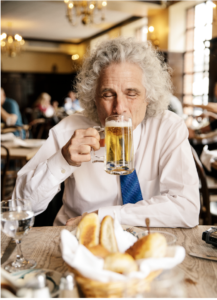Monocle, June 2018
A defiantly large steak – and all the trimmings – in an old-school Williamsburg enclave would provide sustenance for the psychology professor and author’s final musings.
“Growing up in Montréal there was a pretty extensive Jewish delicatessen culture and my father would often bring home deli food on Sundays. But many of my father’s contemporaries died of heart attacks and that affected me when I was a teenager. I didn’t want that to be my fate so I adopted a healthier diet, which meant having red meat and other fatty delicacies in moderation. But here I am. It’s my ‘last meal’ and there’s no sense in forgoing a pleasure for long-term health – so bring on the steak.
I first came to Peter Luger with my wife Rebecca [Goldstein]. She lived in nearby Park Slope and we ate here on one of our dates. She’s a light eater and took home a doggy bag; it fed her for a week. I like that this place is a slice of old New York; even though Williamsburg has been gentrified, the restaurant’s been this way since the 1880s – both its decor and menu. It’s from the era when people unapologetically ate huge slabs of beef and impossibly rich creamed spinach.
As a psychologist I am interested in the psychology of food and the way that a lot of our intuitions about it are highly moralistic. The human mind tends to equate abstemiousness and self-sacrifice with moral purity, and indulgence and carnality with moral turpitude. Studies show that people have a higher moral regard for someone who orders a salad compared with someone who orders a burger. I’ve written about the psychology of self-control and deferral of gratification. The question is, why do we go for one marshmallow today instead of two marshmallows tomorrow? And part of the answer is you never know when you’re going to die.
When I was a child, like most people, I only vaguely knew the difference between psychology and psychiatry. I thought psychology was lying down on a couch while a bald guy took notes in a pad. In college I was always intellectually curious and developed an interest in issues such as what sort of society we can hope for, which ultimately hinges on human nature. Are we naturally violent? Are we co-operative? Are we selfish? Cognitive psychology when I was a college student in the early 1970s seemed to combine the advantages of addressing really big, profound questions while at the same time being intellectually tractable, because many of these questions could be studied experimentally, through data.
The great moral advantage of data is that it treats all human lives as having equal value and calls for our efforts to be commensurate to actual human suffering. Data shows that contrary to the common understanding that modernity has brought decline, decadence, degeneration and doom, the human condition has improved – a lot. Maybe we should welcome its gifts – such as longer, healthier, more stimulating lives – and treat the remaining problems, such as violence or climate change, as ones that can not only be solved but that are in the process of being solved.
Who would I invite to this last meal? I’d ask my wife Rebecca, my two stepdaughters Yael and Danielle, my one-year-old step-grandson Solly, my mother Roz, my sister Susan and my brother Robert, and their spouses. If I got to extend it to people in the past, I would love to have dinner with the philosopher Thomas Hobbes. Not only was he brilliant but he had an ability to turn a phrase that leads me to think he would be good company and an astute observer of human nature. Also Samuel Johnson and Mary Shelley. And I think John Lennon would be great company.”
